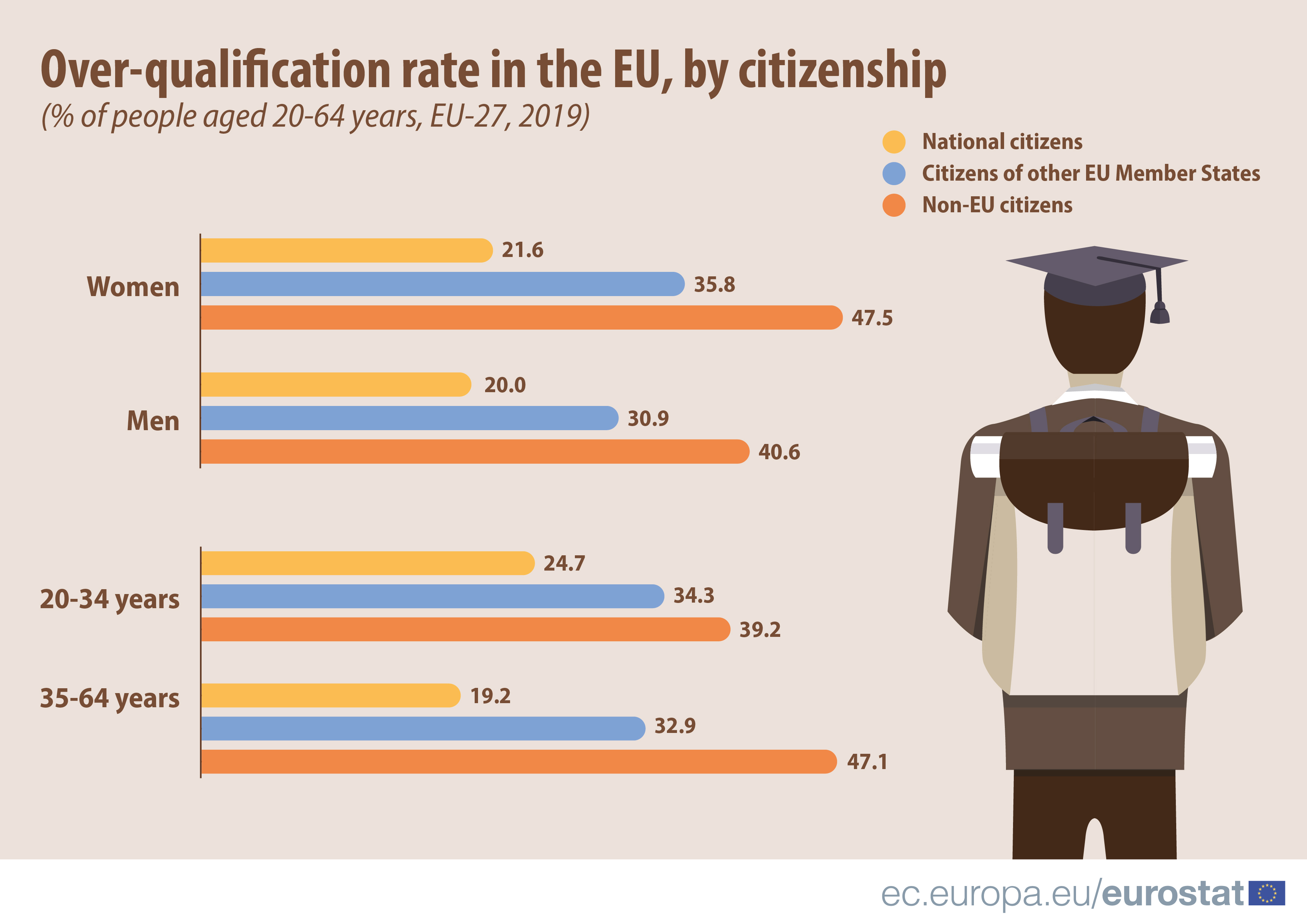Employed foreign citizens are more likely than nationals to be over-qualified for their job: the EU-27 over-qualification rate in 2019 was 44% for non-EU citizens and 33% for citizens of other EU Member States compared with 21% for nationals.
The highest share of over-qualified non-EU nationals was recorded in Greece (78%), followed by Italy (68%) and Spain (62%). For citizens of other EU Member States, the highest shares of over-qualified workers were recorded in Italy, Spain and Cyprus (each 50%). Across the EU Member States, the share of over-qualified employed national citizens was the highest in 2019 in Spain (35%), followed by Greece (32%) and Cyprus (31%).
Luxembourg reported the lowest over-qualification rates overall in 2019, regardless of the citizenship of the workers; with 4% for over-qualified nationals, 5% for citizens of other EU Member States and 8% for non-EU citizens.
The largest differences between over-qualification rates for non-EU citizens and national citizens were recorded in Italy (49.6 percentage points) and Greece (45.3 percentage points). By contrast, the gap between these two rates was less than 5 percentage points in Luxembourg, Slovenia and Ireland. Lithuania was also the only Member State where the over-qualification rate for non-EU citizens was lower than the rate for nationals.
There was generally a smaller difference between over-qualification rates for citizens of other EU Member States and those for nationals. The largest gap among the Member States for which data are available was recorded in Italy (32.4 percentage points), followed by Cyprus (19.2 percentage points) and Ireland (18.7 percentage points). By contrast, the smallest gaps, less than 2 percentage points were observed in France, Belgium and Luxembourg. Only in Czechia was the over-qualification rate for citizens of other EU Member States lower than the rate for nationals.
Women more likely to be over-qualified than men
A comparison of over-qualification rates between the sexes shows that in 2019, women in the EU-27 were more likely to be over-qualified than men, irrespective of their citizenship.
Women’s over-qualification rates among national citizens were 1.6 percentage points higher than those for men; the gap between the sexes was wider for citizens of other EU Member States and for non-EU citizens (4.9 percentage points and 6.9 percentage points respectively).
Young nationals more over-qualified than older workers
As regards the comparison by age group, in 2019 in the EU-27, over-qualification rates for nationals and citizens of other EU Member States were generally higher among younger (aged 20-34 years) rather than older (aged 35-64 years) people, whereas the situation for non-EU citizens was reversed.
The over-qualification rate for younger nationals was 5.4 percentage points higher than the corresponding rate for older nationals. For citizens of other EU Member States this gap was smaller at 1.4 percentage points. By contrast, the over-qualification rate for non-EU citizens was higher among older people than it was for younger people, a difference of 7.9 percentage points.
For more information, you can read our Statistics Explained article Migrant integration statistics - over-qualification.
Note:
- Over-qualified workers are defined here as: those with a tertiary level of educational attainment (as defined by the international standard classification of education (ISCED) levels 5-8) working in low- or medium-skilled occupations (as defined by the international standard classification of occupations (ISCO) groups 4-9) for which a tertiary level of educational attainment is not required.
- The data presented in this news item were derived from the EU’s labour force survey (LFS) – ad-hoc extraction.
- The European Union (EU) includes 27 EU Member States. The United Kingdom left the European Union on 31 January 2020. Further information is published here.
To contact us, please visit our User Support page.
For press queries, please contact our Media Support.



